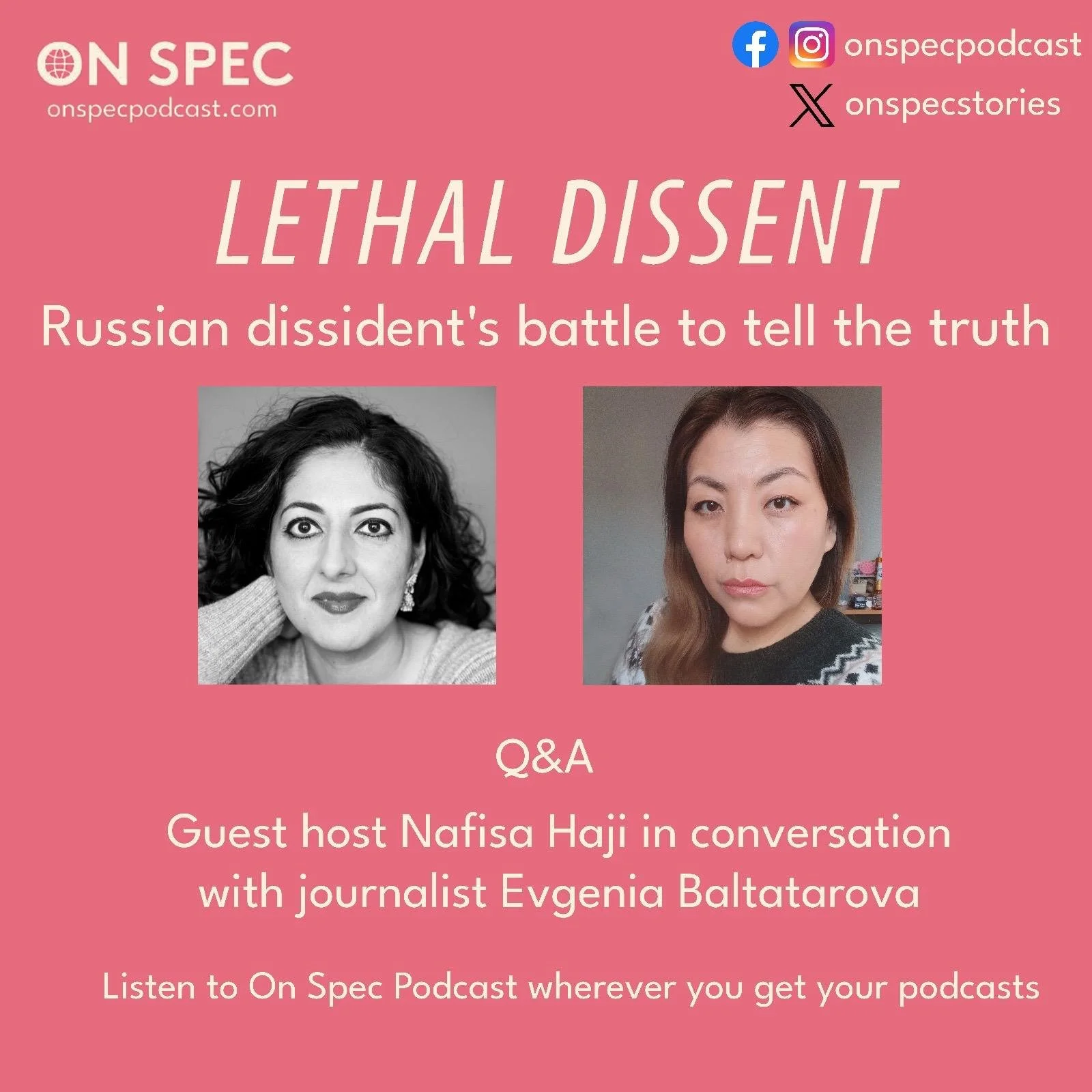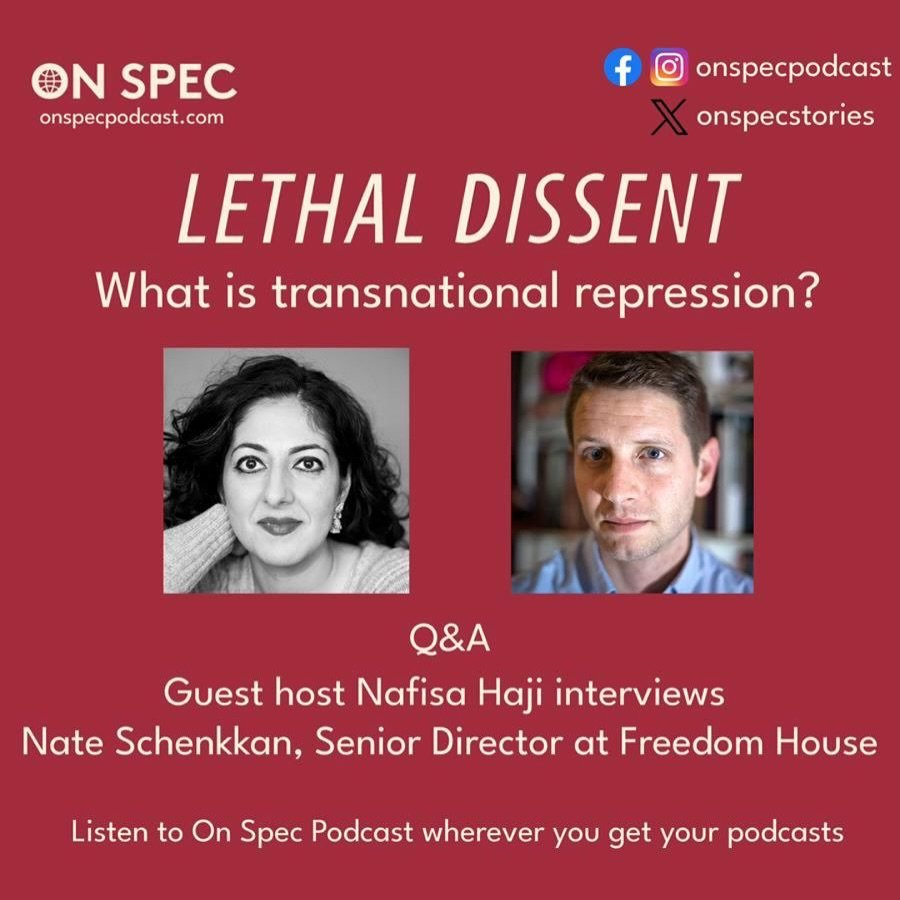Conflict & State Violence
Season 5: Lethal Dissent
Guest Nafisa Haji interviews Evgenia Baltatarova, a journalist and activist from Siberia, who fled Russia for Kazakhstan soon after the start of the war in Ukraine, when authorities ensnared her in a crackdown on critics of the war. Baltatarova had to move countries once again when Russia sought to have her extradited from Kazakhstan, and talks about the toll exile takes on one’s life.
Guest Nafisa Haji interviews Emile Dirks, Research Associate and China expert at Citizen Lab, about Beijing’s tactics for silencing critics abroad, and the controversy over TikTok.
Guest host Nafisa Haji interviews independent journalist and analyst Borzou Daragahi about what it was like covering the killing of Jamal Khashoggi, and what the case says about the growing problem of impunity and transnational repression.
Iranian protesters thought they were about to topple the regime during the Woman, Life, Freedom movement, but once again the regime crushed the demonstrations despite some wins for women. Journalist Samira Mohyeddin talks about the weaknesses and strengths of the movement and why it’s not over. She also gets personal about navigating identity and journalism.
Host Nafisa Haji speaks with Nate Schenkkan, Senior Director of Research at Freedom House, about Transnational Repression. The term is familiar in policy circles and academics but what’s the meaning behind these two words? Who’s accountable for protecting dissidents targeted beyond their own borders by their own countries, and how is policy shaped in a global setting when sometimes countries are both protector and perpetrator?
Guest host Nafisa Haji interviews reporter Fariba Nawa about the adventures of reporting Lethal Dissent for two years, getting threats and the feedback the show received from listeners.
In the final episode, Mohammad Shabani’s suicide note is analyzed by a handwriting expert and Fariba Nawa gets the results. She follows the ripple effects of the new information, and Mohammad’s best friend tries to make sense of what it means.
Fariba Nawa is threatened. She steers her reporting to focus on impunity. The investigation into Iran’s hunt for dissidents goes to the United Nations, inside a Turkish parliamentary hearing, and to the US State Department to find out if anyone will intervene.
The Sağlam family's kidnapping operation is caught in a police dragnet. The ensuing police investigation reveals an entire network of conspirators behind the Sağlams. When one conspirator is arrested and interrogated, he confesses. Fariba Nawa uses the confession to tell the story of Iran's behind-the-scenes involvement.
Rezaie gets into the car with the Sağlams. But he already knew he was being tricked. His suspicions had begun long before he climbed into the car, back at the kebab restaurant when the Sağlams introduced him to an American woman. Fariba Nawa tries to untangle the story of the American woman, and finds out how Rezaie foiled the kidnapping plot against him.
There’s a convincing explanation for Mohammad Shabani’s death, but the evidence is incomplete. While Fariba Nawa waits for a crucial piece of evidence to be analyzed, she tries to find out how far Iran will go to silence dissidents. A Turkish court case exposes an Iranian kidnapping ring and offers an answer. Fariba finds a source to guide her through some of the inner workings of the secret operation.
In the city where the dissident Mohammad Shabani died, Fariba Nawa finds evidence that points towards his cause of death.
Season 4: The Walls We Build
Guest Host Nadene Ghouri takes us with her as she visits the Ukrainian woman who was the surrogate mother for her child. Nadene explains what the experience has taught her about the bond between mother and child, and what it means for women to control their own bodies.
Host Nadene Ghouri talks with Oscar Durand, the producer of On Spec's latest episode, "A Nation’s Two Sides." Durand talks about what it was like growing up in Peru, and the kind of class divisions highlighted in the episode, which was reported by Finnish journalist Kukka Maria Ahokas.
Peru has long struggled with political, cultural, racial, and economic divides, a source of tension that propelled the leftist former schoolteacher Pedro Castillo to the Presidency last year. In the city of Lima, the complex social jigsaw puzzle manifests itself physically: the “Wall of Shame” is three meters high and ten kilometeres long, separating the affluent in La Molina from others in neighboring Villa Maria del Triunfo. Finnish journalist Kukka Maria Ahokas has little trouble crossing this and other barriers, and she introduces us to activist Carlos Hinostroza, who is trying to tear down the wall for all.
Host Nadene Ghouri talks with French-Armenian journalist Astrig Agopian, about her recent reporting for On Spec's episode "When a Frozen Conflict Wakes Up." The episode brought listeners to the Armenia-Azerbaijan frontier, and introduces us to people dealing with a decades-old conflict that turned into another real war in 2020.
Host Nadene Ghouri talks with Angel Bwalya Kasabo and Lewis Yuyi about On Spec's latest episode, which introduces us to families in Zambia trying to move past the stereotypes surrounding their tribal identities in the country.
Tribal identities continue to play a role in social and political rifts in many parts of the world, even erupting into outright conflict. In the southern African nation of Zambia, a younger generation now attempts to bridge the gap between different tribes. But long-held stereotypes make it difficult for Zambians to discard their tribal identity entirely. Zambian journalist and radio host Angel Bwalya Kasabo introduces us to two Zambian families who come from different tribes–the Tonga and Bemba–that have intermarried. These Zambian families have crossed not only tribal borders, but their own borders of prejudice. Their experiences can bring understanding about how to break through tension and misunderstanding between families in a polarized society.
For several decades now, the region of Nagorno-Karabakh has been a source of tension between Armenia and Azerbaijan, occasionally resulting in a real war, like in 2020. But along the shores of lake Joghaz, there are villagers old enough to recall what it was like to live together when both countries were Soviet republics. Today the border is sealed, but villagers can sometimes still hear conversations from across the lake. French-Armenian journalist Astrig Agopian introduces us to villagers who, despite the conflict, still remember that today’s enemy is yesterday’s neighbor, and to people from both backgrounds across the globe who are trying to bridge a geopolitical divide before the next war.
Guest Host Nadene Ghouri tells the story of how her search for a surrogate mother for her child brought her to Ukraine, and how she found herself repaying the ultimate kindness by helping one woman flee the war there.
The French town of Calais is at the heart of a massive security infrastructure program meant to keep refugees and migrants from crossing the English Channel into the United Kingdom. Over the past 20 years, French and British authorities have spent hundreds of millions of pounds on walls, fences, different types of cameras, more police and security agents to keep people away from the shores. In order to do so, private firms have benefited from multi-year contracts to build, maintain or operate in the city and specifically around the port and railway tunnel areas.
Rights organizations and other NGOs say that the infrastructure only forces migrants and refugees to seek out more perilous routes to the UK. Journalists Margaux Benn and Judith Chetrit report from the ground and shed light on this corner of Fortress Europe.
Season 3: Disinformation
Hong Kong protesters were on the streets for more than a year to fight for their freedom of expression after China announced laws to further curb their rights in 2019. Police violently attacked protestors, threw opposition politicians in jail and the country has been polarized as disinformation spreads. Journalist Lisa Jane Harding, based in Hong Kong for 19 years, reports through the eyes of a politician and a chef supporting opposing sides on how the protests split Hong Kong, and if the city can regain lost freedoms.
Season 2: Pandemic
With families in lockdown, and social services unavailable, experts say domestic violence is increasing, and being ignored during the coronavirus outbreak. Menel Raach talks to a woman in Iraq who is trying to find a safe place to live amid the lockdowns there, and to lawyers and experts about what is being called a "shadow pandemic" of domestic violence.
What if you don't have control over your own self-isolation? More than two million people are in prisons in the US, which has the highest incarceration rate in the world. Oscar Durand speaks with Efrén Paredes, Jr about the prison where he is incarcerated serving a life sentence for a robbery and murder committed when was 15 years old. He maintains his innocence. In 2012, the US Supreme Court ruled life sentences without parole for minors were unconstitutional, and Efrén has been awaiting a re sentencing since then. Of the 1,400 incarcerated with him in Michigan's Lakeland Correctional Facility, more than 700 have tested positive for COVID-19, and at least 12 have died.
Season 1: On Spec
Oscar Durand brings you the story of a Bolivian street musician in Istanbul, who like the rest of us, wonders where the years have gone and what he will do with his life. Oscar, a Peruvian and former engineer, found a common bond with Rupi on speaking Spanish and the meaning of life. (Rupi's name has been changed per his request.)
As the world grapples with how to serve justice to thousands of foreign ISIS affiliates captured in Syria and Iraq, Australian journalist Tessa Fox travels to northeast Syria to meet the Australians accused of being affiliated with the group.
Umar Farooq reports on how Pakistan’s tribal areas, once proud of their fierce independence, are ready to join Pakistan proper, and how youth there worked to end a century-old collective punishment law. Locals where caught between US drones, the Taliban, and the Pakistani military. This is the untold story of the war on terror, and what reforms in the tribal areas mean for peace in Afghanistan.
Pesha Magid travels to Anbar to bring you the story of how, and why, locals are risking kidnapping by ISIS to hunt for desert truffles. A rare but beloved delicacy in Iraq, this was the best year for them since the 1990s. The biggest of the truffles grow far out in the remotest regions of Anbar province — where at least a thousand ISIS fighters are suspected to be hiding. With almost no other way of earning a living, Iraqis continue to make the dangerous journey to the desert.



















